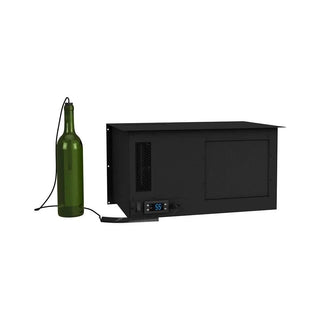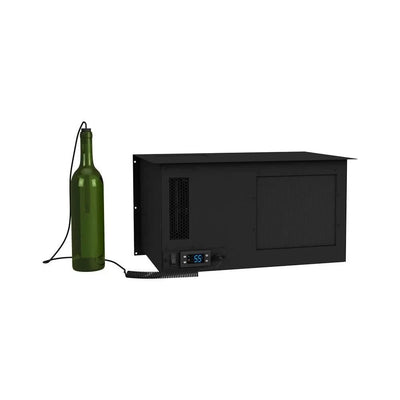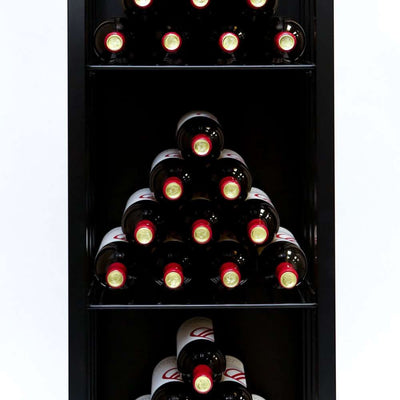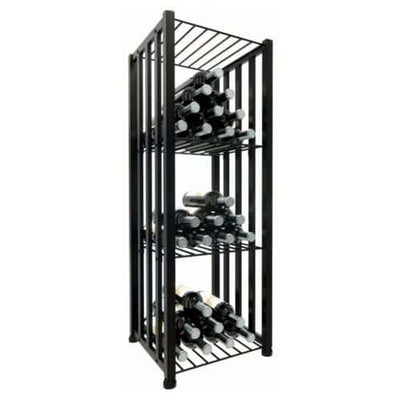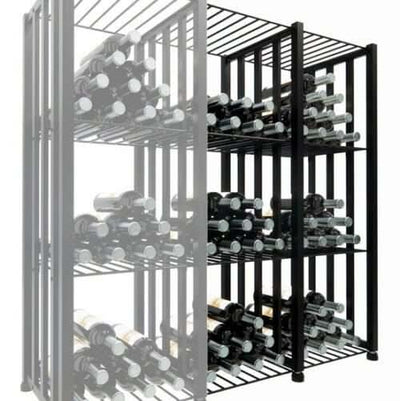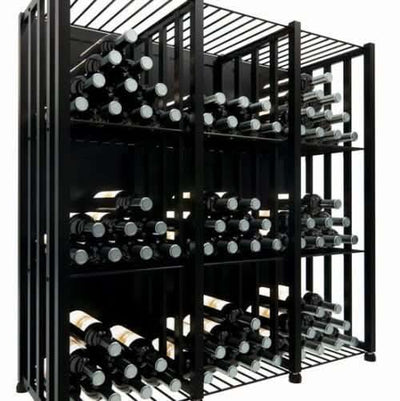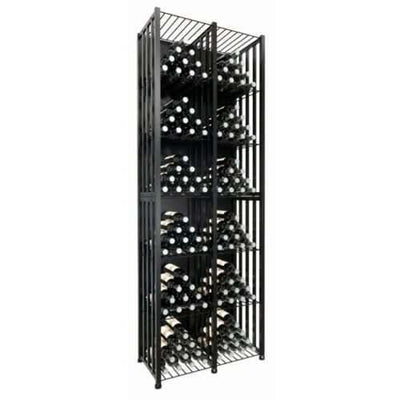By the end of this blog, you’ll have the knowledge to select the perfect height for your floor to ceiling wine rack and turn your wine collection into a stunning masterpiece.
Floor to ceiling wine racks have gained immense popularity, transforming wine into a true work of art within your living space. Yet, amidst the beauty and practicality, there’s one crucial question that often arises. How tall should your floor to ceiling wine rack be?
In this comprehensive guide, we will delve into the nuances of floor to ceiling wine racks, exploring the factors that determine their optimal height. Whether you’re a seasoned wine connoisseur or just starting your collection, understanding the importance of rack height is paramount.
We’ll cover everything from ergonomics and accessibility to materials, customization, installation, and even aesthetic considerations.
Factors Influencing Floor to Ceiling Wine Rack Height
When determining the ideal height for your floor to ceiling wine rack, several crucial factors come into play. Understanding these factors will help you make an informed decision that not only complements your wine collection but also suits your lifestyle and living space.
1. Ergonomics and Accessibility
One of the foremost considerations is ease of access. You want your wine bottles to be readily accessible without the need for a ladder or excessive stretching. Consider the average height of the individuals who will be retrieving wine from the rack. Typically, wine racks are designed to be within arm’s reach, ensuring that you can comfortably access and replace bottles.
2. Wine Bottle Sizes
Consider the types of wine bottles you plan to store. Standard wine bottles, which hold around 750 milliliters of liquid, are the most common. However, if you collect larger format bottles like magnums, you’ll need taller storage spaces. Take an inventory of your collection and plan accordingly.
3. Ceiling Height
The height of your ceiling plays a significant role in determining the maximum height of your wine rack. Measure the distance from your floor to the ceiling accurately. Keep in mind that your wine rack shouldn’t touch the ceiling; leave a small gap for ventilation and aesthetics.
4. Aesthetic Appeal
The height of your wine rack can significantly impact the visual appeal of your space. Some wine enthusiasts prefer a dramatic floor to ceiling display that draws the eye upward, creating a stunning focal point. Others opt for a more understated design that blends seamlessly with the room’s aesthetics.
5. Customization and Modular Design
If you prefer flexibility, consider modular wine rack systems. These allow you to adjust the height and configuration of your wine rack as your collection grows or your preferences change. Modular racks are excellent for those who want the freedom to experiment with different heights over time.
6. Installation and Structural Considerations
Ensure that the chosen height is structurally sound and safe. If you’re installing a heavy wine rack, it’s essential to have secure anchoring to prevent accidents. Consult with a professional if necessary to ensure proper installation.
7. Themed Wine Rooms and Cellars
If you’re creating a themed wine room or wine cellar, the height of your wine rack can contribute to the overall atmosphere. For instance, in a rustic or Old World-themed wine room, you might opt for a lower ceiling with exposed wooden beams, which can be complemented by shorter wine racks that enhance the cozy ambiance.
8. Wine Rack Configurations
Consider the layout and configuration of your wine rack. Some designs incorporate various heights and angles within the same rack system. These configurations can add visual interest and provide unique storage solutions for different bottle sizes or types, allowing you to customize the height of individual sections.
9. Lighting and Display
The height of your wine rack can also impact how you choose to illuminate and display your collection. Tall wine racks can benefit from strategic lighting placement to highlight specific bottles or sections. This can create a captivating visual effect, especially when hosting wine tastings or gatherings.
10. Future Growth
Plan for the future growth of your wine collection. If you anticipate acquiring more bottles over time, consider leaving extra space at the top of your wine rack for expansion. This prevents you from having to replace or modify the entire rack as your collection evolves.
11. Harmonizing with Room Elements
Take into account other elements in the room, such as furniture and decor. Your wine rack’s height should harmonize with these elements, creating a cohesive and balanced visual appeal. It’s essential to ensure that your wine rack doesn’t overpower or clash with other design features.
12. Personal Taste and Style
Ultimately, your personal taste and style should guide the decision. Whether you prefer a minimalistic, contemporary design or a more traditional, ornate appearance, the height of your wine rack should reflect your individual style and enhance your enjoyment of your wine collection.
13. Balance with Room Proportions
Consider the proportions of the room in which you’re installing the wine rack. The height of the rack should harmonize with the overall scale and layout of the space. In rooms with high ceilings, a taller wine rack can create a sense of grandeur and fill the vertical space effectively. In contrast, rooms with lower ceilings may benefit from a more modest height to avoid feeling cramped.
14. Integration with Existing Design
Your floor to ceiling wine rack should seamlessly integrate into your existing interior design. Take into account the colors, materials, and design elements in your room. The rack’s height should complement these elements, enhancing the overall aesthetics. For example, if your room features wooden furniture and warm tones, a wooden wine rack of suitable height can create a cohesive and inviting atmosphere.
15. Showcase and Storage Balance
Think about the dual purpose of your wine rack – showcasing and storage. Some collectors prefer to display their bottles prominently, turning them into a visual centerpiece. Others prioritize storage efficiency, especially for larger collections. The height of your wine rack should strike the right balance between showcasing your favorite bottles and efficiently storing the rest.
16. Safety Considerations
Last but not least, don’t overlook safety. Ensure that your floor to ceiling wine rack is securely anchored to the floor and ceiling to prevent accidents. Consider earthquake safety measures if you live in an area prone to seismic activity. Safety should always be a top priority when determining the height and stability of your wine rack.
17. Wine Rack Material Implications
The material of your wine rack can influence the height choice. For example, if you opt for a metal or glass wine rack, which typically has open and airy designs, you might prefer a taller rack to create an impressive visual impact. Conversely, wooden wine rack designs, with their classic and solid appearance, can be striking even at moderate heights. Consider how the material interacts with the overall height aesthetics.
18. Maintaining Temperature Control
Consider the impact of height on temperature control within your wine storage area. If you’re storing wines for extended periods and require consistent temperature and humidity levels, a taller wine rack might affect the temperature distribution. Ensure that your wine storage area’s climate control system is capable of maintaining uniform conditions throughout the height of the rack.
Mocking Up the Design
Before finalizing the height, consider creating a mockup or using design software to visualize how the wine rack will look in your space. This can be especially helpful if you’re customizing the rack or combining multiple units. Visualizing the final result can prevent surprises and ensure the chosen height aligns with your vision.
For those seeking a truly bespoke wine storage solution, experimenting with prototypes or mockups can be beneficial. This allows you to assess the look and functionality of different heights before committing to the final design. It’s a hands-on way to fine-tune your wine rack’s height to perfection.
Finally, don’t consider your chosen height as a permanent decision. As your collection grows or your design preferences evolve, be open to reevaluating the height of your floor to ceiling wine rack. Wine storage should be a dynamic and adaptable aspect of your home, so feel free to make adjustments as needed.
Common Heights for Floor to Ceiling Wine Racks
While the ideal height for your wine rack depends on the factors mentioned above, here are some common height ranges that work well for various scenarios.
- Standard Ceiling Height (8-10 feet): For homes with standard ceiling heights, wine racks typically range from 6 to 8 feet in height. This provides ample storage space while maintaining accessibility.
- Higher Ceilings (10-12 feet): In homes with taller ceilings, wine racks can extend from 8 to 10 feet or more. This creates a visually striking display and allows for more extensive collections.
- Modular and Adjustable Racks: These racks are versatile and can be adjusted to various heights based on your preferences. They are an excellent choice for wine collectors who plan to expand their collections over time.
Selecting the Right Floor to Ceiling Wine Rack Material
Choosing the right material for your floor to ceiling wine rack is a crucial decision that can impact both its aesthetics and functionality. Different materials offer unique benefits and styles. Here’s a closer look at some common materials for wine racks.
1. Wood: Wooden wine racks are classic and versatile. They provide excellent insulation, making them suitable for long-term storage. Wood complements various interior styles, from traditional to modern. Different wood types, such as oak, pine, or mahogany, offer distinct appearances.
2. Metal: Metal wine racks, often made from steel or wrought iron, provide a sleek and contemporary look. They are durable and come in various finishes, including black, chrome, or bronze. Metal racks are excellent for showcasing your wine collection.
3. Glass: Glass wine racks create an open and airy feel. They are perfect for displaying your bottles prominently. Glass racks can have a minimalist, elegant appearance and work well in modern and minimalist interior designs.
4. Acrylic: Acrylic wine racks offer a transparent and minimalist aesthetic. They are lightweight and easy to clean. Acrylic racks blend seamlessly into contemporary spaces and allow your wine bottles to take center stage.
5. Hybrid Materials: Some wine racks combine different materials, offering a unique look. For example, a wood and metal hybrid can provide a rustic-industrial appearance, while a glass and metal combination offers a modern and industrial vibe.
Consider the aesthetics, insulation properties, and maintenance requirements of each material when choosing the right one for your floor to ceiling wine rack. The material you select should align with your overall design vision and the characteristics of your wine collection.
Frequently Asked Questions about Floor to Ceiling Wine Racks
1. What is a floor to ceiling wine rack, and how does it differ from other wine storage options?
A floor to ceiling wine rack is a vertical wine storage solution designed to maximize space by utilizing the height of a room, typically from the floor to the ceiling. Unlike traditional wine racks or wine cabinets, these racks make efficient use of vertical space while offering a striking visual display of your wine collection.
2. What are the benefits of using a floor to ceiling wine rack?
Floor to ceiling wine racks efficiently use vertical space, accommodating a large wine collection without taking up valuable floor space. They serve as captivating focal points, turning your wine collection into a work of art that enhances your living space. These racks can transform underutilized areas, such as corners or alcoves, into functional and organized wine storage zones.
3. Are floor to ceiling wine racks suitable for long-term wine storage?
Yes, they can be suitable for long-term storage, depending on factors like the material used, temperature control in your storage area, and your wine collection’s specific requirements. Wooden wine racks, for instance, are often preferred for long-term storage due to their insulation properties.
4. Do floor to ceiling wine racks require professional installation?
The need for professional installation varies based on the rack’s complexity and your DIY skills. While some modular designs allow for self-installation, intricate or customized racks may benefit from professional installation.
5. What are some safety considerations when using floor to ceiling wine racks?
Ensure your wine display rack is securely anchored to the wall or ceiling to prevent accidents, especially in earthquake-prone areas. Additionally, consider childproofing if you have young children or pets.
6. Can I combine different materials in a floor to ceiling wine rack design?
Yes, many wine rack designs allow for combining materials, creating a unique and customized look. Mixing wood, metal, glass, or acrylic can result in visually striking wine storage solutions.
7. How do I maintain and clean a floor to ceiling wine rack?
Maintenance typically involves regular dusting and inspection for structural issues. Cleaning depends on the material. For example, wood may require occasional refinishing, while glass and acrylic are easier to clean with a soft cloth.
8. Can I add lighting to my floor to ceiling wine rack for better visibility?
Yes. Adding lighting, such as LED strip lights or puck lights, can enhance the visual appeal of your wine rack and make it easier to read wine labels.
9. Are there any considerations for earthquake-prone areas when installing floor to ceiling wine racks?
Yes. Safety is crucial in such areas. Make sure the wine rack is securely anchored to both the floor and ceiling, and consider using earthquake-resistant fasteners to prevent accidents during seismic activity.
10. Can I add a lock or security feature to my floor to ceiling wine rack?
Yes. If security is a concern, you can incorporate locks or security features into your wine rack design to protect your valuable wine collection.
11. How often should I inspect my floor to ceiling wine rack for structural integrity?
Regular inspections are essential to ensure the rack remains safe and secure. Consider checking for stability and any signs of wear or damage every few months.
Conclusion
Selecting the right height for your floor to ceiling wine rack involves a thoughtful evaluation of your specific needs, the characteristics of your wine collection, and your design preferences.
Whether you choose a standard height for convenience or opt for a dramatic, towering display to make a statement, your wine rack should enhance both the aesthetics of your space and the accessibility of your wines.
As you plan your floor to ceiling wine rack, consider seeking advice from professionals or experts in wine storage solutions to ensure that your chosen height aligns with the long-term goals for your wine collection. Ultimately, the perfect height is one that enhances your enjoyment of wine and complements the ambiance of your home.


























